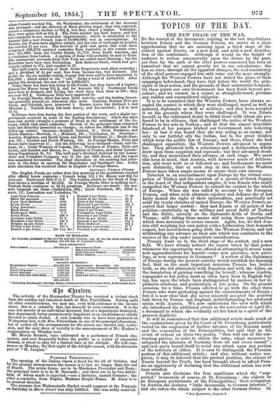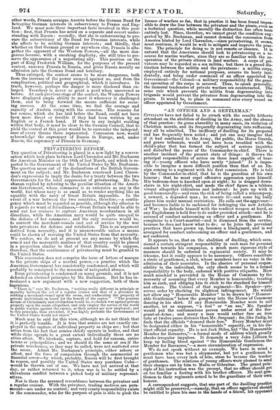TOPICS OF THE DAY.
THE NEW PHASE OF TICE WAR.
BY the receipt of the documents relating to the last negotiations between Russia and the German Powers, we arrive at a clear apprehension that we are entering upon a third stage of the contest against Russia, on a new field, and with a new distribu- tion of the combatants. Although it would be the height of rashness to reckon unreservedly upon the future by the past, yet thus far the path of the chief powers concerned has been so consistent that we cannot greatly err in our calculations : the less so since, through all the apparent changes, the real consistency of the chief powers engaged has only come out the more strongly. Although the Western Powers have not stated the plans of their campaigns beforehand, they have laid before the world the prin- ciples of their action, and the grounds of their substantial demands. On these points our own Government has been frank beyond pre- cedent ; and we cannot, in a course so straightforward, presume any sudden and unconsidered obliquity. BY the receipt of the documents relating to the last negotiations between Russia and the German Powers, we arrive at a clear apprehension that we are entering upon a third stage of the contest against Russia, on a new field, and with a new distribu- tion of the combatants. Although it would be the height of rashness to reckon unreservedly upon the future by the past, yet thus far the path of the chief powers concerned has been so consistent that we cannot greatly err in our calculations : the less so since, through all the apparent changes, the real consistency of the chief powers engaged has only come out the more strongly. Although the Western Powers have not stated the plans of their campaigns beforehand, they have laid before the world the prin- ciples of their action, and the grounds of their substantial demands. On these points our own Government has been frank beyond pre- cedent ; and we cannot, in a course so straightforward, presume any sudden and unconsidered obliquity.
It is to be remarked that the Western Powers have always ac- cepted the contest to which they were challenged, moral as well as material, diplomatic as well as military ; and they have accepted it on the grounds where they were challenged. It was Russia herself, in the infatuated desire to blind those with whom she pro- fessed to be in alliance, that challenged the notice of the Western Powers to her acts in Turkey ; and at first the almost incredible falsehood of her purpose tricked our Government into believing her : at last it was found that she was acting as an enemy, not only to our faithful ally the Sultan, but to the great treaties which form the public law of Europe ; and there, where she had challenged opposition, the Western Powers advanced to oppose her. They advanced with a reluctance and a deliberation which drew upon them suspicion and reproach ; but they advanced stead- ily, and they maintained their advance at each stage. We must also keep in mind, that Austria, with however much of delibera- tion, also went with us or followed us ; and furthermore we must note distinctly, that at each step in this contest the Western Powers have taken ample means to secure their own success.
Detected in an encroachment upon Europe by the virtual occu- pation of Turkey and the assertion of a species of Greek Papacy in the heart of that independent empire, it was Russia who really compelled the Western Powers to extend the contest to the whole of Europe. When she was called to account by the European Powers, and when with alternate cajolery and defiance she at last fairly denied the right of their intervention, and practically set aside the treaty statutes of united Europe, the Western Powers ac- cepted that larger contest : they met Russia at all points of her position-materially on the military and naval fields of Turkey and the Baltic, morally on the diplomatic fields of Berlin and Vienna ; still taking those means and using those opportunities which were necessary to secure success. Again, too, we find Aus- tria still weighing her own policy with a deliberation that demands respect, but nevertheless going with the Western Powers, and not withholding any advance on their side which was conducive to the success of the step under immediate consideration. Prussia leads us to the third stage of the contest, and a new field. We have already noticed the course taken by that power whenever the opportunity was offered of attempting to secure some new aggrandizement for herself-some new province, new privi- lege, or new supremacy in Germany.' A review of the diplomacy of Europe during the present century would establish the damning fact, that on the most important occasions Prussia has broken faith, as she did alternately with Napoleon and with the Allies, on the temptation of gaining something for herself ; whereas Austria, repugnant as her policy must so often have been to English feel- ing, has upon the whole been distinguished by candour in her di- plomatic relations, and particularly of late years. On the present occasion, for a time, Prussia affected to go with the other three Powers who were protesting against the encroachments of Russia ; but it is now clear that she never sincerely accepted the position laid down by France and England, notwithstanding her professed union with Austria. We now understand the view with which she introduced the additional article in the convention of April 20 ; a document to which she evidently set her hand in a spirit of the grossest duplicity.
It will be remembered that this additional article made much of the explanations given by the Court of St. Petersburg, particularly rested on the suspension of further advance of the Russian army and the evacuation of the Principalities, but said that in the event of refusal on those two points, "then will one of the con- tracting parties, in order to obtain the same, adopt measures to safeguard the interests of Germany from all and every inroad"; and each party bound itself to resist any attack upon any portion of the territory of either. It is easy to distinguish the Prussian portion of this additional article ; and also, without undue sus- picion, it may be inferred that the present position, the retreat of Russia beyond the Pruth, has been brought about to afford Prus- sia an opportunity of declaring that the additional article has now been satisfied.
Prussia also disclaims the four conditions which she "sup- ported," insincerely of course, at St. Petersburg : she objects to an European protectorate of the Principalities ; their occupation by Austria she declares "little favourable to German interests"; and she refers the whole subject to the other German States. In See Spectator., August 5.
other words, Prussia arraigns Austria before the German Bund for betraying German interests in subserviency to France and Eng- land. We must note three important facts involved in this posi- tion: first, that Prussia has acted on a separate and covert under- standing with Russia ; secondly, that she is endeavouring to pro- cure the subserviency of the Band for Prussian interests, while she affects to be seeking German interests ; and thirdly, that whether on that German ground or anywhere else, Prussia is alto- gether the opponent of the Western Powers,—all the more dan- gerous because, with a sneaking duplicity, she still tries to pre- serve the appearance of a negotiating ally. This position on the part of King Frederick William, for the purposes of the present contest, annexes Prussia to Russia, and gives Russia morally an admission into the German Bund and territory. Thus enlarged, the contest seems to be more dangerous, both from the increase of the power arrayed against us, and from the complication, political and geographical, which it introduces. In truth, however, perhaps the danger is more disclosed than en- larged. Treachery is never so great a peril when uncovered as before. At each previous stage of the contest, the Western Powers have displayed ample ability to meet it wherever it challenged them, and to bring forward the means sufficient for secur- ing success. At the same time, we find the courage and sagacity of Austria rising with the occasion. The reasons for her course, which she has laid before the Bund, could not have been more direct or forcible if they had been written by an English or a French hand. If there is any insight residing within that body, it must be clear to the German Council, that to yield the contest at this point would be to surrender the independ- ence of every throne there represented. Concession now, would acknowledge the supremacy of Russia in Europe, and, under Russia, the supremacy of Prussia in Germany.



























 Previous page
Previous page